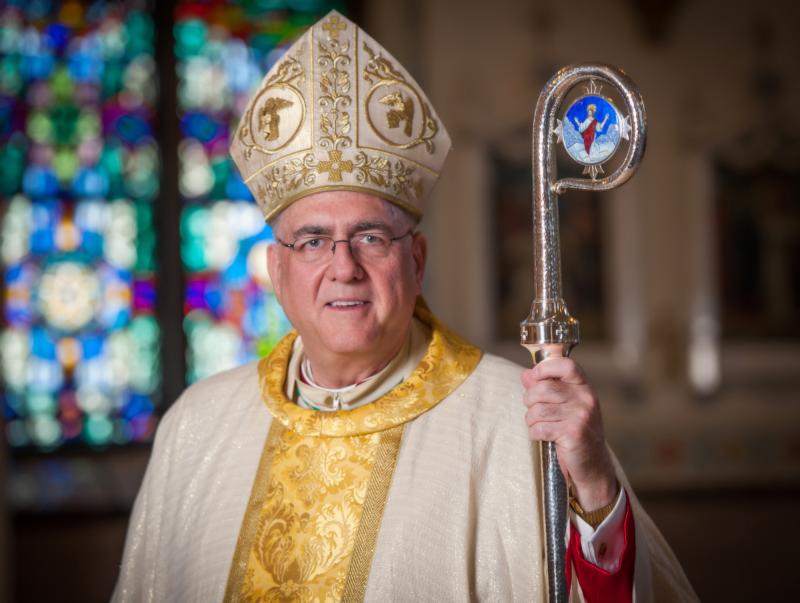
by Archbishop Joseph F. Naumann
This coming Sunday is the solemnity of Christ the King of the Universe. The feast was originally instituted by Pope Pius XI in 1925 in response to a growing secularism and nationalism.
Webster defines secularism as “indifference to or rejection or exclusion of religion and religious considerations.”
As a philosophy, secularism seeks to interpret life on the principles taken solely from the material world.
If Pope Pius XI thought secularism was a challenge in 1925, what would he think of our society today?
One manifestation of the strength of secularism in the United States is the aggressive efforts by powerful forces within American society to limit severely religious liberty to include only freedom of worship.
The First Amendment to the U.S. Constitution reads: “Congress shall make no law respecting an establishment of religion or prohibiting the free exercise thereof; or abridging the freedom of speech, or of the press, or of the right of the people peaceably to assemble and to petition the Government for a redress of grievances.”
Clearly, our Founders did not want a state religion. Many had fled post-Reformation Europe, where they had suffered persecution under state- established religions.
At the same time, the Founders sought to protect the free exercise of religion. They did not want a state religion persecuting other religious groups but, rather, wanted individual Americans to have broad freedoms to live in a manner consistent with their deeply held religious beliefs.
As recently as the 1990s, both the Senate and U.S. House of Representatives with overwhelming bipartisan support passed the Religious Freedom Restoration Act that required the government to respect the religious convictions of Americans.
The right of religious expression was to be limited only when it impinged on an even more fundamental right and, in those rare cases, the government must pursue a course that was least burdensome to religious freedom.
The secular state was imagined to be a neutral arbitrator protecting the rights of free expression of a variety of religious beliefs without giving preference to any particular creed.
Sadly, a growing atheistic secularism in recent decades has sought to impose its own belief system upon Americans. It attempts to sanitize any reference to God from public life, even though this was clearly not the intent or the practice of our Founders.
Pius XI was also concerned about an extreme nationalism that should not be confused with patriotism. Our faith encourages us to be patriotic by being engaged citizens who strive to contribute to the welfare of our nation.
Pius XI was concerned about an extreme nationalism that contributed to the causes for World War I and also led to World War II.
The solemnity of Christ the King reminds us as Catholics that our first allegiance is to God. Jesus Christ is the Lord of our lives. Jesus came to inaugurate a kingdom.
However, his kingdom is not political or geographical or based on race or ethnicity. Our Lord’s kingdom is not based on popular support or military superiority. His kingdom is a kingdom of the heart. For members of his kingdom, our first priority is to live in a manner consistent with his teaching and example.
Who is the Lord of our life? What is most important to us as evidenced by the time and attention we devote to it?
For some people, the Lord of their life is money or the material comforts money can provide. For some, it is being respected and well regarded by others, especially one’s professional peers.
For some, it is entertainment or the experience of intense pleasure. For some, it is our personal autonomy and in the words of that great philosopher — Frank Sinatra — doing things my way.
For the Catholic, the Lord of our life, the king of our heart, is Jesus Christ. This should be self-evident by the priorities of our lives. If Jesus is truly our king, then prayer — time in conversation with the Lord — must be a significant part of our daily schedule.
If Jesus is our king, then the Sunday Eucharist is the most important event in our weekly schedule and nothing could prevent us from participating. If Jesus Christ is our sovereign, then it will be apparent by our concern and respect for others, especially the poor, the weak and the vulnerable. If Jesus is Lord, then people should admire in us an irrepressible hope and joy.
On Christ the King Sunday, let us ask the question: Do the priorities of my life give evidence that Jesus is Lord of my heart? If your answer is “yes,” praise God!
If your answer is “not really,” it is time for an attitude and priority adjustment.

